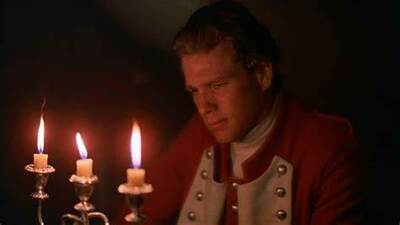In 1964, he had his first big break when he landed the role of Rodney Harrington on “Peyton Place,” a soap opera that was an adaptation of the once-scandalous novel by Grace Metalious that exposed the hypocrisies and scandals barely hidden beneath the well-manicured surfaces of a seemingly ordinary American small town. Although a broadcast television show of that time could hardly begin to touch on the seamy stuff that made both the book and the 1957 film adaptation such big hits in their time, the show nevertheless proved to be an instant hit and much of its initial popularity was due to audience fascination with the relationship that developed between Harrington and local girl Allison MacKenzie (Mia Farrow), much to the consternation of her mother (Dorothy Malone) and his girlfriend (Barbara Parkins). Although Farrow left the show after two seasons, O’Neal stuck with it until it left the air in 1969 and towards the end of its run, he appeared in the pilot for a proposed series, “European Eye,” and when that went nowhere, he found himself wondering what to do next.
Following in the footsteps of Parkins and Farrow, who had had respective hits with “Valley of the Dolls” (1967) and “Rosemary’s Baby” (1968), O’Neal found himself pursuing a career on the big screen. His first film lead came in “The Big Bounce,” the 1969 adaptation of an Elmore Leonard crime novel that was poorly received by practically all who encountered it at the time, including Leonard himself, though it has a certain quirky charm to it. This was followed by “The Games,” a 1970 sports drama in which he played an American Olympic marathon competitor that also failed to make much of a mark, critically or commercially. However, this project would prove to be very beneficial to him because the film’s co-writer, Erich Segal, noticed him and recommended him as a potential star for an upcoming project that he had written the script for, based on his own novel. At the time, the role in question had been turned down by any number of hot young actors of the period and when O’Neal was finally officially offered the part, the story goes, he had to choose between that or a Jerry Lewis project that would have paid him several times what he was going to get for it.
That film, of course, turned out to be “Love Story” (1970) in which he and Ali McGraw played a pair of star-crossed young lovers—he a child of wealth and privilege attending Harvard and she a working-class music student at Radcliffe—whose relationship faces hurdles ranging from Harvard losing to Cornell in a hockey championship to his being cut off financially by his stern father (Ray Milland) to her being diagnosed with a terminal illness that leads to heartbreak, tears and the immortal line “Love—love means never having to say you’re sorry.” Although some critics at the time scoffed at what they felt was little more than sappy melodrama (Gary Arnold wrote “I found this one of the most thoroughly resistible sentimental films I’ve ever seen”), others, including Roger Ebert, raved about it. This was clearly an audience picture and once the word got out about the undeniable screen chemistry between the two leads, it became a box-office phenomenon, at one point peaking as the sixth highest-grossing film in Hollywood history, and earned seven Oscar nominations, including nods for Picture, Director Arthur Hiller and the two leads, both of whom became instant superstars as a result of its success. (In 1978, a sequel, “Oliver’s Story,” would appear in which O’Neal’s grief-stricken character would find love once again with a new love played by Candice Bergen and that is the last that we shall speak of that one.)

